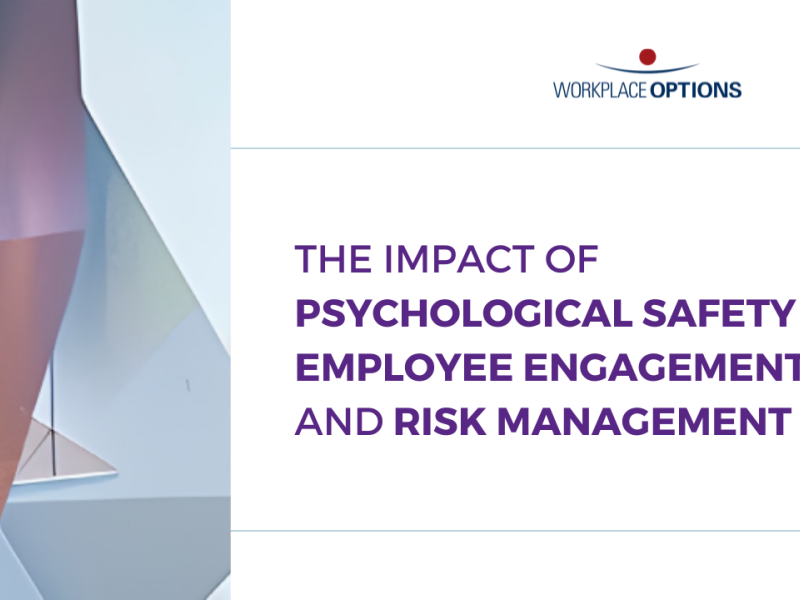Business leaders worldwide believe psychological safety boosts bottom line, yet gaps persist in addressing psychosocial risks
A new global research study from Workplace Options (WPO) and IIRSM reveals a critical disconnect in corporate wellbeing efforts.
While 93% of business leaders around the world agree that psychological safety directly impacts business performance, many organisations lack clear strategies to address psychosocial risks.
The study, ‘The Impact of Psychological Safety on Employee Engagement and Risk Management’, underscores the urgent need for companies to evolve beyond traditional risk management and integrate psychological wellbeing as a core business priority.
Psychological safety: a competitive advantage
The study confirms that fostering psychological safety leads to greater innovation, higher employee engagement and reduced turnover.
93% of leaders agree that a psychologically safe workplace boosts productivity and innovation.
9 out of 10 respondents estimate a return of at least 6% on investments in psychological safety, with over one-third projecting returns above 20%.
A widening gap between strategy and execution
Despite widespread recognition of the importance of wellbeing, execution remains inconsistent:
88% of organisations have workplace wellbeing strategies, yet only 29% describe them as ‘very comprehensive.’
24% of respondents say their wellbeing programmes are ‘lacking’ or ‘somewhat lacking.’
60% of organisations either lack trained personnel to address psychosocial risks or are unsure if such roles exist.
A shift in risk management priorities
Historically, companies have prioritised physical safety over psychosocial risks, but this mindset is evolving. The study highlights the need for:
Stronger coordination across functions: Risk management, HR, and wellbeing teams must collaborate with clear accountability, supported by executive leadership.
Regular psychosocial risk assessments: Businesses should conduct frequent assessments tailored to different locations, job functions and teams.
Manager training and support: Front-line supervisors play a key role in fostering team wellbeing and should receive training to identify risks and connect employees with support services.
Comprehensive wellbeing strategies: Digital wellbeing apps are useful but should be one element of a broader, tailored wellbeing approach.
Crisis preparedness: Organisations must have proactive response systems in place for crises and traumatic events, including post-trauma support.
“Organisations need a clear health and wellbeing strategy,” said Sabreena Roberts, Director Professional Services at IIRSM. "One that focuses on both physical and psychological wellbeing and is at the centre of the organisational strategy. But that alone is not enough. Leadership must drive the adoption of the strategy across all levels of the organisation, and it needs to be effectively integrated within day-to-day operations in order for risks to be managed, performance to improve and the business to excel.”
“Most organisations today recognise the importance of employee wellbeing, but few are taking action with meaningful impact,” said Dr Mahua Ganguly, corporate medical professional and employee health strategist. “An effective strategy involves measuring, diagnosing, and evaluating risks, implementing programmes, and continuously improving them. Wellbeing is a leadership responsibility, and the benefits are too immense to ignore.”
WPO, the leading independent provider of workplace wellbeing and psychological safety solutions, released a groundbreaking Psychosocial Risk Screener in November 2024. The cutting-edge tool, along with the new research study, were developed to help business leaders and managers identify and address critical issues such as harassment, social isolation, violence, occupational stress and sources of trauma before they escalate into serious risks to employee health, wellbeing, and productivity.
Governments worldwide continue to issue mandates requiring employers to ensure the psychosocial safety of their workers. Countries including those in the European Union, Mexico, Chile, the UK, Canada, Japan, South Korea, Australia and Colombia have passed legislation that directs organisations to identify, eliminate and prevent psychosocial hazards in the workplace.
“As these regulations force employers to implement top-down reviews of their work environments, job designs and corporate cultures, the challenge lies in integrating these shifts into the DNA of their organisations,” said Alan King, WPO President and CEO. “The research results of the study present a roadmap for business leaders to understand their risk profile and implement solutions that dive deep into the root causes of workplace issues. By addressing these challenges directly, organisations can target their resources effectively, ensuring meaningful, long-lasting change.”
Thank you for enquiry
A member of staff will be in touch soon. Regards, IIRSM




